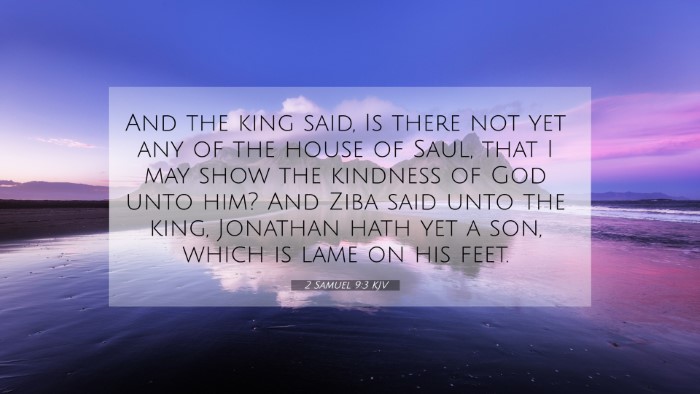Old Testament
Genesis Exodus Leviticus Numbers Deuteronomy Joshua Judges Ruth 1 Samuel 2 Samuel 1 Kings 2 Kings 1 Chronicles 2 Chronicles Ezra Nehemiah Esther Job Psalms Proverbs Ecclesiastes Song of Solomon Isaiah Jeremiah Lamentations Ezekiel Daniel Hosea Joel Amos Obadiah Jonah Micah Nahum Habakkuk Zephaniah Haggai Zechariah Malachi2 Samuel 9:3 Similar Verses
2 Samuel 9:3 Cross References
And the king said, Is there not yet any of the house of Saul, that I may show the kindness of God unto him? And Ziba said unto the king, Jonathan hath yet a son, which is lame on his feet.
Uncover the Rich Themes and Topics of This Bible Verse
Listed below are the Bible themes associated with 2 Samuel 9:3. We invite you to explore each theme to gain deeper insights into the Scriptures.
2 Samuel 9:3 Cross Reference Verses
This section features a detailed cross-reference designed to enrich your understanding of the Scriptures. Below, you will find carefully selected verses that echo the themes and teachings related to 2 Samuel 9:3 KJV. Click on any image to explore detailed analyses of related Bible verses and uncover deeper theological insights.
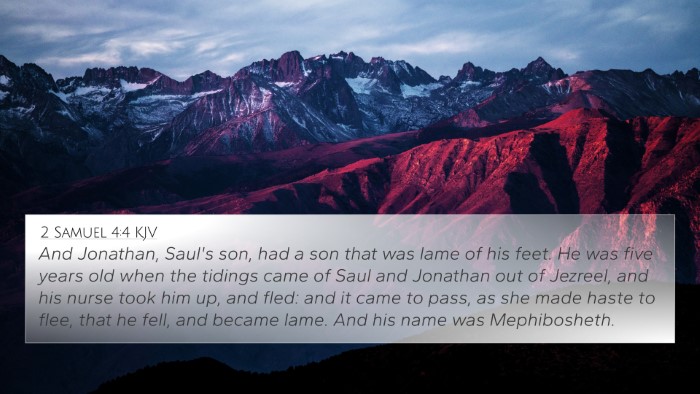
2 Samuel 4:4 (KJV) »
And Jonathan, Saul's son, had a son that was lame of his feet. He was five years old when the tidings came of Saul and Jonathan out of Jezreel, and his nurse took him up, and fled: and it came to pass, as she made haste to flee, that he fell, and became lame. And his name was Mephibosheth.

1 Samuel 20:14 (KJV) »
And thou shalt not only while yet I live show me the kindness of the LORD, that I die not:

Matthew 5:44 (KJV) »
But I say unto you, Love your enemies, bless them that curse you, do good to them that hate you, and pray for them which despitefully use you, and persecute you;
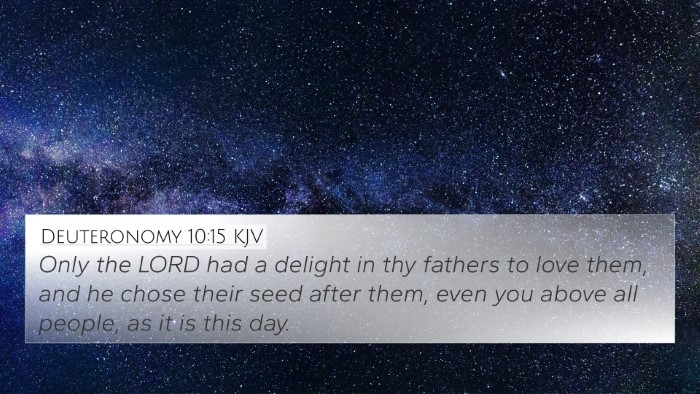
Deuteronomy 10:15 (KJV) »
Only the LORD had a delight in thy fathers to love them, and he chose their seed after them, even you above all people, as it is this day.
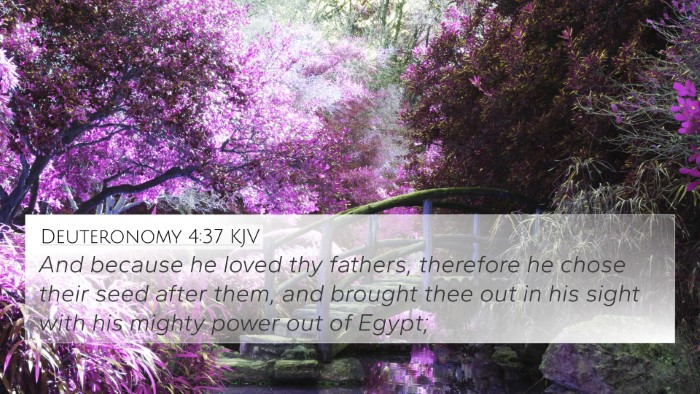
Deuteronomy 4:37 (KJV) »
And because he loved thy fathers, therefore he chose their seed after them, and brought thee out in his sight with his mighty power out of Egypt;
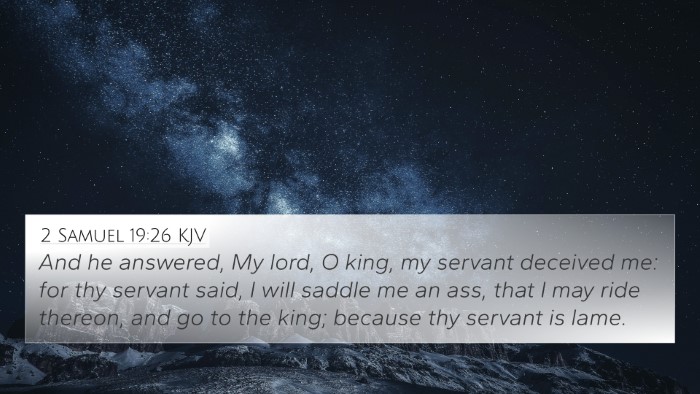
2 Samuel 19:26 (KJV) »
And he answered, My lord, O king, my servant deceived me: for thy servant said, I will saddle me an ass, that I may ride thereon, and go to the king; because thy servant is lame.

Titus 3:3 (KJV) »
For we ourselves also were sometimes foolish, disobedient, deceived, serving divers lusts and pleasures, living in malice and envy, hateful, and hating one another.
2 Samuel 9:3 Verse Analysis and Similar Verses
Understanding 2 Samuel 9:3
Verse: "And the king said, Is there not yet any of the house of Saul, that I may shew the kindness of God unto him?" (2 Samuel 9:3)
This verse captures King David's inquiry about any remaining members of Saul's household to whom he could extend kindness. David's desire highlights themes of grace, loyalty, and divine providence, showcasing the interconnection between biblical narratives and the overarching theme of God's mercy.
Commentary Insights
Matthew Henry's Commentary
Matthew Henry notes that David's question arises from his understanding of God's covenant with Jonathan, Saul's son. David’s kindness is not merely a political gesture but a fulfillment of love and loyalty to Jonathan, illustrating a profound commitment to family and friendship. Henry emphasizes how the act of showing kindness to an enemy's family member is a reflection of divine grace, paralleling the mercy shown to humanity.
Albert Barnes' Notes
Albert Barnes highlights that David’s search for any remaining member of Saul’s lineage underscores a significant shift in royal dynamics. He interprets this inquiry as David’s intent to display God’s kindness, linking it to God’s covenant with David. Barnes connects this kindness to the larger narrative of redemption and grace seen throughout Scripture, indicating that David acts as a type of Christ, bringing grace to the undeserving.
Adam Clarke's Commentary
Adam Clarke reflects on the historical context, noting that David's kindness stands out amidst the usual political motives of kings. His desire to bless Mephibosheth, Jonathan’s son, is seen as a beautiful representation of God’s goodwill toward humanity despite our sins. Clarke points to the significance of remembering and honoring covenants, which enriches our understanding of God's unchanging nature in fulfilling promises.
Thematic Connections
The exploration of 2 Samuel 9:3 reveals significant thematic connections within the Bible:
- God's Covenant Loyalty: The linkage of David's actions to God’s enduring faithfulness demonstrates the theme of covenant loyalty throughout Scripture.
- Grace Extended: This verse echoes themes of grace found in passages such as Ephesians 2:8-9, where grace is central to salvation.
- Mercy over Judgment: Similar to John 3:17, David chooses mercy over judgment, suggesting a divine pattern in dealing with humanity.
- The Importance of Family: David’s search emphasizes the honor and respect for familial ties, paralleling the stories of Ruth and Naomi (Ruth 1:16-17).
Bible Verse Cross-References
Here are key cross-references related to 2 Samuel 9:3 that illuminate its meaning:
- 1 Samuel 20:14-17: Jonathan’s covenant with David emphasizes loyalty.
- 2 Samuel 4:4: Introduction of Mephibosheth, revealing the severity of Saul’s downfall.
- Psalm 18:50: God's kindness to His anointed and their descendants.
- Matthew 5:7: Blessed are the merciful; they will be shown mercy.
- Romans 5:8: God demonstrates His love through Christ’s sacrificial act, paralleling David’s kindness.
- Lamentations 3:22-23: The Lord's mercies that are new every morning relate to divine grace depicted in David’s actions.
- Luke 6:36: Jesus teaches about being merciful as the Father is merciful.
Conclusion
2 Samuel 9:3 serves as a profound reminder of God's kindness manifested through human actions. In exploring this verse, we find connections not only within the narrative of David and Saul but also within the broader scheme of God’s grace and mercy towards humanity.
Understanding this passage invites a deeper exploration of biblical texts, encouraging believers to engage in cross-referencing throughout Scripture to uncover the rich, interconnected tapestry of God’s message. Utilizing tools such as a Bible concordance or a cross-reference Bible study guide can enhance this journey, leading to a more comprehensive understanding of the Biblical narrative.


